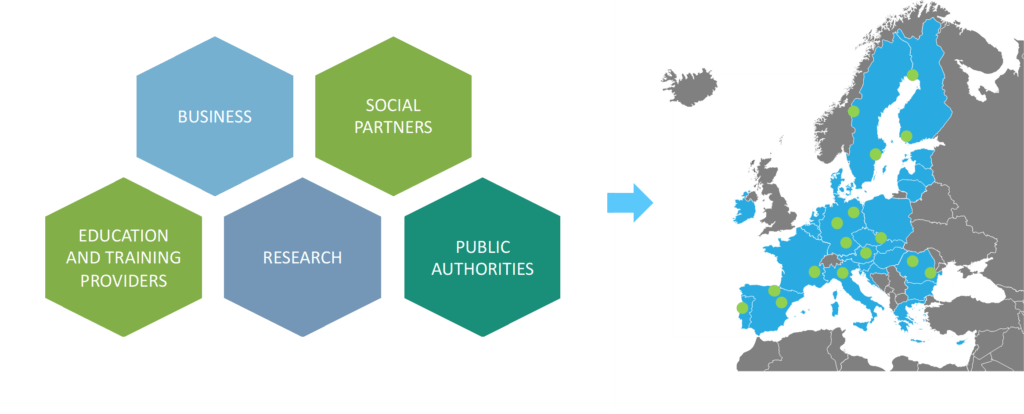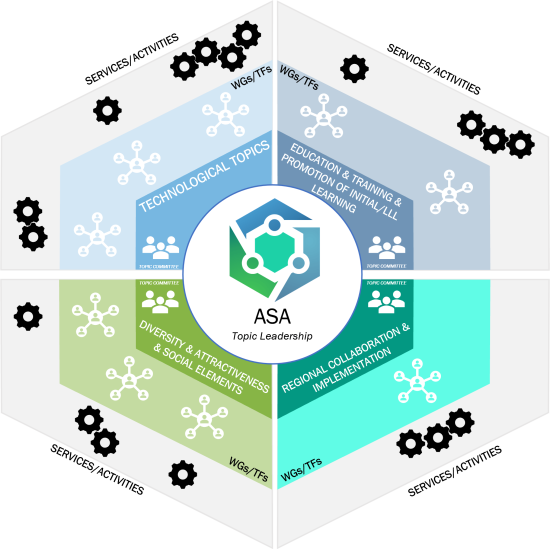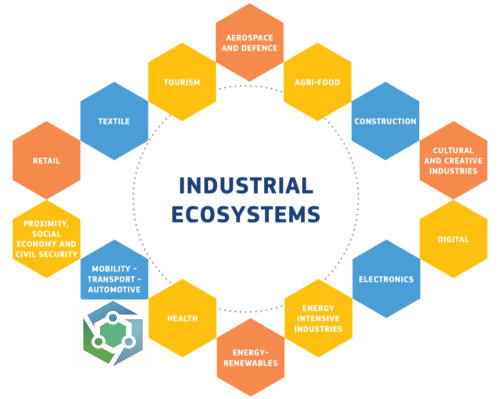Automotive Skills Alliance
- Europe & Stakeholder-wide Partnership for collaboration on Skills Agenda in the Automotive-Mobility Ecosystem
- The ASA was annouced and officially launched in November 2020
- The ASA became a legal entity (non-profit organization) in January 2022
The Automotive Skills Alliance (ASA) is focused on the re-skilling and up-skilling of workers in the automotive sector, developing intelligence and fostering dialogue among all relevant partners and stakeholders in the sector, and supporting the elaboration of specific plans for re-skilling, up-skilling and training of workers in the EU automotive sector.

The ASA mission is to contribute to a better coordination of relationships at the European level of all the relevant national or regional stakeholders in automotive ecosystem, in order to ensure and develop a common platform for collaboration and best practice sharing across borders. In this regard, ASA intends to ensure continuous, pragmatic and sustainable cooperation on the skills agenda in the ecosystem.
Objectives

Collaboration Through Projects
ASA builds upon the work carried out by strategic projects in the skills agenda for the ecosystem & promotes and facilitates initiation of new projects/initiatives or support mainstreaming the existing once.
Automotive Sector – (Jan 2018 – Mar 2022)
The Blueprint project on Strategic Sectoral Skills Collaboration in Automotive Sector. Focused on skills needs & offer, training recognition and training developments in the automotive sector.

Batteries Sector – (Dec 2019 – Nov 2023)
The Blueprint project on Strategic Sectoral Collaboration in Batteries for Electromobility Sector. Focused on skills needs & offer, support of training developments in the battery sector.
An opportunity to build on the
best practices and initiate new projects and collaborations
Ambition and Commitments
The overall ambition:
- Upskill 5% of the workforce each year (resulting in 700,000 employees up or reskilled)
- Start implementation in pilot regions and pilot projects
The first set of KPIs include:
- Number of workers to be re-orientated and upskilled
- Number and skills profiles of new jobs created
- Number of agreed personal development plans
- Number of successful trainings certifications
- Number of workers entering a new or revised job position
- Number of involved stakeholders and coverage of the ecosystem and of countries and regions
Working Groups and Committees
The Automotive Skills Alliance is composed of four individual Topic Committees which are coordinated by the ASA Office:
- Technology – The Technology Committee prioritizes Repair and Maintenance, Batteries, Hydrogen, Digitalisation, Electronics Packaging, Software/System Development, Life Cycle Assessment (LCA), and Environmental Footprint. With a focus on extending device lifespan and minimizing electronic waste, the committee explores sustainable energy solutions, integrates digital technologies, and evaluates environmental impacts for a holistic and sustainable technological approach.
- Education – The Education Committee focuses on advancing learning through effective programs, training, and the promotion of both initial and life-long learning. By prioritizing continuous education, the committee aims to equip individuals with the skills needed to thrive in an ever-changing world.
- Social Aspects – The Social Aspects Committee prioritizes diversity, attractiveness, and key social elements. Committed to inclusivity, it actively promotes diversity and works towards enhancing social appeal and engagement. The committee focuses on creating a harmonious and inclusive society that values diversity for a vibrant and enriching social environment.
- Regional Dimension – The Regional Dimension Committee prioritizes regional collaboration and effective implementation, fostering collective efforts to address shared challenges. Emphasizing collaborative strategies, the committee aims to create a resilient regional framework for sustainable solutions benefiting local communities.
Topic Committees are responsible for the evaluating, steering, and recommendation provision to specfic Groups which are present under each Committee area, thus steering the ASA activities in specific areas. The structure of Groups and Committees combines, in principle, a horizontal and vertical approach. Groups are of a vertical nature and ASA member types groups represent a horizontal perspective (involving industry, education/training providers, social partners, regions, and more). Each group has clearly defined working plan and may be permanent (working group) or temporary (task force). Groups may use the guidance of developed methodology to select various activities which may be executed to improve the European Skills Intelligence.
- Members of ASA participate in groups or may establish various groups.
- Topic Committees recommend and steer the activities of the groups.
- Each group works on specific selected activities in the context of the European Skills Intelligence.

More on the methodology may be found by clicking the buttons below:
Note that the following structure and methodology improvement was developed thanks to the ERASMUS+ funded project FLAMENCO, thus views and opinions expressed are however those of the author(s) only and do not necessarily reflect those of the European Union or the European Education and Culture Executive Agency (EACEA). Neither the European Union nor EACEA can be held responsible for them.
![]()

Groups Overview
Activity: Networking and Collaboration; and various.
Members: OLIFE Energy, ASA, VSB-TUO
Objectives:
Foster discussions on battery-related topics, align PIECE, CaBatt, TRIREME, VOLTAGE. Review battery passport training, expand train-the-trainer, and define new roles in VET and recycling. Plan collaboration on VET Forum for May and October.
Activity: Job Role Definition & Update; Training; Exams; Course Pilot; Certification
Members: Various
Objectives:
Refine ISO 5600x innovation models and update the Innovation Agent Skill Card (2018–2023). Involve experts and certifiers to deliver training and assessment in innovation management.
Activity: Collaboration; Skills Analysis; Training; Exams; Course Pilot
Members: Newton University, VSB-TUO, Trnava Region, SPIN360
Objectives:
Organise biyearly updates, seek joint funding (e.g., ERASMUS+), and extend network collaboration on soft skills, based on the PASS project.
Activity: Collaboration, Conferences & Events
Members: 13 EU regions incl. Castilla-y-Leon, Lombardy, Moravian-Silesian, etc.
Objectives:
Foster inter-regional cooperation to support automotive workforce reskilling and coordinate regional initiatives aligned with green and digital goals.
Activity: Networking, Conferences, Company Visits
Members: ASA, Trnava Region, WRS, Continental Automotive Timisoara, ATIT, APTE
Objectives:
Host Timisoara visit (12–13 May 2025), facilitate skill-strategy roundtables, company tours, and exchanges with trainers and learners in the Romanian automotive sector.
Topic Committee: Technology
Activity: Networking and Collaboration; and various.
Members: OLIFE Energy, ASA, VSB-TUO,
Objectives:
The focus of this working group is to foster discussions on battery-related topics, facilitate networking, and strengthen collaboration between various projects. By linking different activities, the mission is to promote battery-specific actions while ensuring regular updates on battery education from involved stakeholders. A key aspect includes aligning efforts across PIECE, CaBatt, TRIREME, VOLTAGE, and other relevant partners to streamline education and training developments. Additionally, updates on battery job roles will be reviewed, and if necessary, a dedicated task force will be created to address emerging needs in the sector.
The expected outcomes include a comprehensive review of the battery passport training (PIECE Project), assessing its potential for revision and expansion, with a specific focus on extending train-the-trainer initiatives in April. Priorities for the skills agenda will be established, particularly addressing vocational education and training (VET) needs, such as technician roles and recycling expertise. Furthermore, the alignment and refinement of reference definitions will be explored, ensuring consistency with ALBATTS job roles and identifying necessary updates to meet industry demands. Invitation and collaboration on VET Forum for battery teachers (CaBatt) will be done for events in May and October.
Topic Committee: Technology
Activity: Job Role Definition & Update; Training; Exams, Pilot of the Course; Recognition and Certification.
Members: Various
Objectives:
The Innovation Agent Task Force, a collaborative initiative focused on helping organizations refine and streamline their innovation management processes. Contributing to shaping ISO 5600x based assessment models, training and skills for Innovation Agents and Assessors required in the automotive industry. A first version of an Innovation Agent Skill Card has been created from 2018 to 2023 in the EU project DRIVES to document the innovation skills needed in the automotive industry summarizing all required skills for Innovation.
In the Innovation Agent Task Force experts, development partners, training providers and certifiers join to develop and review the ISO 5600x based Innovation Agent and Assessor Skill Card, create appropriate training material, and provide training and certification in innovation management.
Topic Committee: Education
Activity: Networking & Collaboration, Skills Analysis & Skills Needs, Training, Exams, Pilot of the Course
Members: Newton University, VSB-TUO, Trnava Region, SPIN360
Objectives:
- Hold Biyearly Meetings – Schedule and conduct biyearly meetings to review progress, discuss advancements, and introduce new developments in key competences.
- Look for funding opportunities – to submit as a group, e.g. ERASMUS+.
- Expand Networking Opportunitiesand Collaboration on Key Competence – Identify and participate in events or opportunities relevant to key competence, actively expanding the network and presence within the field. Continuous collaboration among the stakeholders to update on the latest developments in the key competencies (soft skills) needs, training courses, assessmnent, etc. The Group will meet twice a year to update all members about the latest developmnets and plan future steps. It is based on the result of PASS project. As a part of the group outcomes might be future projects, initiatives
Topic Committee: Regional Dimension
Activity: Networking & Collaboration,
Conferences & Events.
Members: Castilla-y-Leon Spain; Lombardy Region Italy; Moravian-Silesian Region Czech Republic; Cluj-Napoca Romania; Stuttgart Region Germany; Trnava Region Slovakia; Mangualde Portugal; Auvergne-Rhone-Alpes France; Grand Est Alsace Champagne-Ardenne; Lorraine France; Catalonia Spain; Skellefteå kommun Sweden; Goteborg Sweden.
Objectives:
The ASA Regional Implementation Working Group focuses on fostering cooperation across regions to support the up- and reskilling of the automotive workforce within the European automotive ecosystem. Goals include creating a united regional force for promoting skills development, organizing strategic projects at the regional level, and enabling a just transition aligned with EU Green and Digital policies.
Topic Committee: Regional
Activity: Networking and Collaboration, Conference/s and Events
Members: ASA, Trnava Region, WRS, Continental Automotive Timisoara, ATIT, APTE
Focus:
Organisation of Study Visits under the ASA in specific regions to have participants network and learn about the industry and other fields connected to the skills and training within the auomotive-mobility ecosystem and beyond. Simillar to what was organised initially in the Stuttgart region: Stuttgart Study Visit – an opportunity for rich discussions within the European Year of Skills : AUTOMOTIVE SKILLS ALLIANCE (automotive-skills-alliance.eu) or Grand Est Region: Regional Skills Experts Discuss the Future of Automotive Skills in Grand Est
Goals:
- Networking of ASA members and key players of the industry
- Company Visits
- Learning about industry and fields connected to the automotive-mobility sector and education
- Learning about the region
Event:
Study Visit in Timisoara, Romania, on May 12th and 13th, 2025!
This group – “Study Visit – West Development Region of Romania – Timis County” – offers to participants a great opportunity to attend discussions and share practical insights related to the world of up- and reskilling on one of Romania´s automotive regions.
- roundtable discussions on skills strategies and the topics of training and attractiveness,
- a visit to important companies in the region (to be established in due time) and
- several opportunities for questions and exchange with employees, trainers and students going through the up- and reskilling in times of unprecedented transition of the automotive industry.
Topic Committee: Education
Activity: Conference and Event Cooperation
Members: Automobile Club de l’Ouest, Hydrogen Europe Research, EDUCAM, TU Dortmund, Karlsruhe Institute of Technology, Vamia, ACEA, ASA, Arcturus.
Objectives:
- Update participants on the latest Hydrogen developments,
- train the trainer activity (present the results or training courses from Hydrogen Blueprint (job skills mapping), Hydrogen CoVE, ASA, EII PfS),
- create networking and collaboration possibility specifically on hydrogen education for VET level (specifically IVET) in Europe.
The Hydrogen VET Forum is part of the 2024 FIA World Endurance Championship 6 Hours of Spa- rancorchamps (Belgium) of May 2024
HYDROGEN VET FORUM
Teachers’ Course on Hydrogen in mobility at Spa FIA WEC
Spa- Francorchamps (Belgium), 09 – 11 May 2024
At the Hydrogen VET Forum, you will learn more about hydrogen and its use in mobility, covering topics such as fuels cells and use of H2 in ICE, as well as safety when handling hydrogen tanks and refuelling stations, to name a few. The theoretical training will be complemented by exchanges with experts and drivers from the two racing teams who demonstrate H2 prototypes in competition for a zero emission motor racing. Participants will also have the opportunity to attend demonstration laps to see these teams in action.
Target group: Teachers working on vocational education and training (VET)
The course consists of two parts:
- During April 2024, online courses which will take 1 to 2 days with the aim to give the participants enough basic knowledge of the hydrogen aspects and applications before the physical event in Spa-Francorchamps (Belgium) – registration in the platform: learn.skills-framework.eu/login/signup.php.
- A 2-day face to face event in Spa, Belgium from 9 – 11 May (see programme below)
About Hydrogen VET forum in Spa
The Hydrogen VET forum in Spa is an initiative launched by the Automobile Club de l’Ouest, the FIA World Endurance Championship, the MissionH24 and its partners Automotive Skills Alliance[1], GreenSkillsforH2[2] and Skills Alliance for Industrial Symbiosis, as part of the 2024 FIA World Endurance Championship 6 Hours of Spa-Francorchamps. The Hydrogen VET forum in Spa aims to gather current and future teachers and trainers to share ideas and good practices, work together and deepen their knowledge about the hydrogen ecosystem. The event will collect about 20 teachers and trainers from around Europe.
Topic Committee: Regional
Activity: Networking and Collaboration, Conference/s and Events
Members: Trnava Region, WRS, ASA, Grand Est Region
Focus:
Organisation of Study Visits under the ASA in specific regions to have participants network and learn about the industry and other fields connected to the skills and training within the auomotive-mobility ecosystem and beyond. Simillar to what was organised initially in the Stuttgart region: Stuttgart Study Visit – an opportunity for rich discussions within the European Year of Skills : AUTOMOTIVE SKILLS ALLIANCE (automotive-skills-alliance.eu)
Goals:
- Networking of ASA members and key players of the industry
- Company Visits
- Learning about industry and fields connected to the automotive-mobility sector and education
- Learning about the region
Event:
Study Visit in Grand Est, on June 27th and 28th, 2024!
The region of Grand Est invited to join for a two-day event in Strasbourg promising a rich programme packed with interesting discussions and practical insights into the world of up- and reskilling in one of Europe´s automotive regions.
The programme of the Study Visit encompasses roundtable discussions on skills strategies and the topics of training and attractiveness, a visit to the Renault plant, André Citroen vocation school and several opportunities for exchange with employees, trainers and students going through the up- and reskilling in times of unprecedented changes in the automotive industry.
Building on the success of last year’s ASA Study Visit in Stuttgart, we are excited to bring this first-hand experience and insight to the region´s automotive companies and training facilities for a limited number of ASA partners, with a strong interest to connect, learn and help to shape the future of collaboration in the automotive-mobility ecosystem!
A Skills Partnership for the Automotive Ecosystem
- Pact for Skills is the first flagship action of the European Skills Agenda, firmly anchored in the principles of the European Pillar of Social Rights. It also supports the EU Industrial Strategy and the goals of the Green Deal and the digital transformation.
- The goal of the Pact is to mobilise and incentivise private and public stakeholders to invest and take concrete action for the upskilling and reskilling of people of working age.
- It is a shared engagement and approach to mobilise all stakeholders to invest in skills for the growth and sustainable development of private and public businesses of all sizes.
- The Pact facilitates the launch of skills partnerships, in particular it aims to build large-scale multi-stakeholder skills partnerships addressing the needs of the 14 industrial ecosystems identified in the EU Industrial Strategy.

ASA JOINT PROPOSAL
Download the latest summary and ASA joint proposal.
ASA JOINT PROPOSAL SUMMARY
Download the latest summary and ASA joint proposal summary.